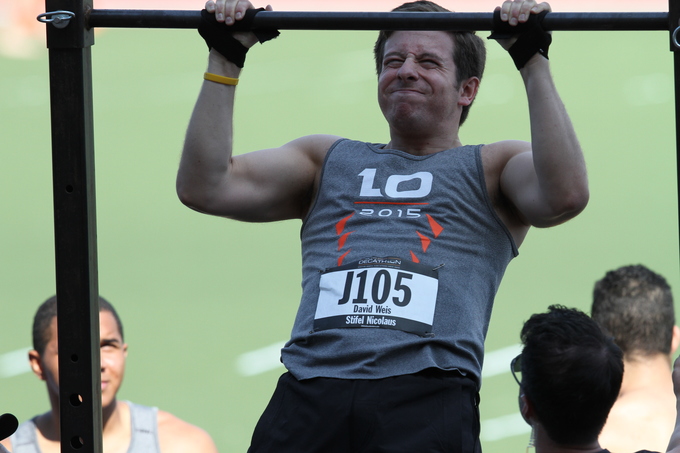UNBROKEN [Installment 11.16]
May 24, 2016

Market: New York
Athlete: David Weis (Millstein & Co.)
My most powerful memories from last year’s experience were all related to the generosity I saw from donors – whether family and friends or total strangers. I was blown away by their support both in donations and in notes of encouragement.
In fact, my very first donation last year was from another Decathlete, whose words of encouragement set the stage: “I saw you haven’t begun fundraising, but I’m inspired by your story and I’m sure others will be too, so don’t hold back.” So I didn’t. Just prior to game day, I was interviewed for an article that appeared on Bloomberg, and the outpouring of support from complete strangers was a feeling I can’t easily forget. I received emails from colleagues in offices across the country asking if it was okay that they forward my message to their friends - and in turn, their friends donated as well.
With an initial goal of $3,000, I raised over $8,700.
Last year I was one of the – if not the – youngest individual competitors. Showing up on game day was intimidating but invigorating. I remember thinking to myself, “Hopefully, we’re all in it just to have fun.” While the days after were certainly not fun (with a tanktop sunburn – the likes of which were previously unknown to man), The Decathlon itself was an incredible experience, and I could not have been more impressed with the men and women participating. Everybody was friendly, enthusiastic, incredibly athletic and passionate – I’ve never in my life had so many total strangers yelling encouragement at me while rowing.
But the competition aspect of The Decathlon is not the main reason I did it, and not even the main reason I’m coming back for round two. I do it because I can very closely relate to the cause –
I’m a cancer survivor.
I was diagnosed with cancer 2 days before my 19th birthday in August of 2010. Days later, I went in for hours of surgery, just 9 days before starting my freshman year of college. I underwent radiation treatment in the weeks leading up to Thanksgiving break and was declared cancer-free thereafter, though I still routinely see doctors to check up.
It’s easy to get caught up in the competition aspect itself on game day – legs pumping, lungs burning, the hot sun beating down. But at that very same time, just a few short miles away at Sloan Kettering, there’s probably a little girl looking out her window and wishing she could play on the playground. At the very same time, just a few short miles away at Sloan Kettering, there are probably young parents waiting anxiously to hear what can be some pretty terrible news about their child. At the very same time, just a few short miles away at Sloan Kettering, kids are being wheeled into surgery, or undergoing experimental treatments and therapy, wishing they could go back to school.
I know this all too well.
When people ask about my story, it’s become almost routine for someone else to share their own experiences with cancer, whether a family member or friend fighting the battle – or they themselves. It’s a ubiquitous disease, one in which nearly everyone has had some sort of experience. Who doesn’t know someone who has had cancer?
Cancer’s ubiquity, however, can be turned on its head – it’s the inspiration for events like The Decathlon.
The sense of empathy when it comes to cancer is incredibly powerful. Perhaps you can’t imagine the complex feelings of a teenage college student who wanted little more than to leap into the life of a college student cancer-free – but I was that teenage college student. In an odd way, in fact, I felt lucky. I had access to the top doctors in the world, family and friends to help me through it all, and health insurance. I had hope that I would make it through. I had people who could empathize with what I was feeling.
That sense of empathy is what enables events like The Decathlon to really make a difference. Rather than just being an event to test our athleticism and endurance, it’s become a conduit of hope. Our donations and support are used to fund the best research for pediatric cancer and provide the highest standard of care for pediatric cancer patients so that the tragedy of cancer’s ubiquity might end sometime soon.
We do this not just for the challenge of the events or the rush of competition or the pump of adrenaline. We do it for that kid in a hospital room and those parents in the waiting room. We do it because we can all too easily relate to the tragedy of cancer’s ubiquity – and we want to change it.
Bring it,
David